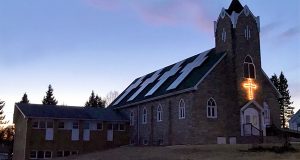The National Parks of Lake Superior Foundation (NPLSF) has partnered with the Cane-Bridge Foundation to bring lessons of the predator-prey restoration at a United States Park to Spanish-speaking students. Cane-Bridge (Puentes de Caña in Spanish) and the NPLSF announced the release of Spanish educational lesson plans and a new documentary film: “The Return of Wolves: Lessons from the Wilderness.” From dramatic footage of wolf captures, to wolves teaming up to form new packs, the film explores the predator-prey relationship between wolves and moose in Isle Royale National Park.
The film joins the researchers as they develop the science to expand our understanding of how the wolf-moose relationship can alter the ecosystem. In addition to the release of the Spanish version, teachers will find an expanded curriculum for grades 9-12 with new lesson plans added in both English and Spanish.
Restoring a wolf population is complicated, especially when it comes to yielding the best possible genetic match-ups. Eighteen wolves were released to restart the population which had dwindled down to two at the time of restoration. The NPLSF has captured videography of mated pairs and focused on the role these wolves will play in the restoration of the predator-prey relationship in a new educational documentary for teachers. NPLSF Executive Director Tom Irvine said, “Knowing how wolves fascinate people, and knowing teachers are dealing with constantly changing demands, we developed lesson plans for all student age groups. We especially appreciate the Cane-Bridge Foundation expanding the availability of the film by offering a translated version.” The Spanish lesson plans and film are available for free at https://nplsf.org/lecciones-de-la-zona-silvestre.
Spanish is the second most-spoken language in the United States, with the country containing 41 million Spanish-speaking households. The Spanish language documentary release makes information about this ecosystem much more available around the country and worldwide. Teachers and students will be able to explore questions raised by this film and have discussions about species restoration in Spanish. The lesson plans are structured around a variety of topics, ranging from observation skills to climate change. Distance learning allows students to join Park personnel and researchers in the field via the film and is a unique opportunity for classrooms and for homeschooled students.
Robert Cañizares, Cane-Bridge Foundation board member stated: “The Cane-Bridge Foundation feels that it is critical to offer school children examples of the key relationships in the natural world. The lessons learned from Isle Royale National Park experience can have relevance world-wide as they clearly highlight the importance of ecological balance in nature, and specifically the complex predator-prey relationships. Children who grow up with this understanding will be better equipped to assess the consequences of human intervention in the environment, so this educational material is extremely valuable. We are proud to partner with the National Parks of Lake Superior Foundation to make this film and to make the lesson plans also available in Spanish.”
Isle Royale National Park is in the far northwest remote corner of Michigan surrounded by Lake Superior. After the park decided to restore the wolves to function as the top predator on an island populated with a large prey base of moose, the NPLSF started to document activities related to expanding knowledge of how ecosystems function, the difficulties in restoring the population, and the role of a dynamic predator in impacting a large prey.
The restoration effort involved two countries, two states and two indigenous tribes, all working together to capture new wolves for the new population. The documentary is the culmination of filming and chronicling the first four years of the restoration of the predator-prey relationship at the Park. It is an expansion of the Curiosity’s Stream’s original short documentary, “Breakthrough: Return of the Wolves” that was released in 2020.
Collaboration and support for the work came from park personnel at Isle Royale National Park who explained the complexities of the decision to restore wolves and provided logistical support for the restoration and the documentary film; the International Wolf Center helped fund the transfer of wolves and distribute this film; Curiosity Stream provided the films production; researchers from Michigan Technological University and the State University of New York described past and future studies of the predator prey relationship, and the US-based Cane-Bridge Foundation funded the translation of the film and the lesson plans into Spanish.
The NPLSF appreciates the cooperation of the state, provincial, federal and tribal collaborators who supported the capture and transport of the wolves to begin the new island population: The Grand Portage Tribe of Chippewa, the states of Michigan and Minnesota, and the province of Ontario and Michipicoten First Nation.
The Spanish version is available at https://nplsf.org/lecciones-de-la-zona-silvestre.
For English visit: https://www.nplsf.org/lessons-from-the-wilderness.
The Foundation also presents the Lake Superior Podcast and English speaking show that highlights the five National Parks that surround Lake Superior.
The hosts, Walt Lindala and Frida Waara, introduce listeners to the people plac3es and projects that make this Great Lake so remarkable. To listen to the podcast, visit: https://nplsf.org/lake-superior-podcast. For more information on the documentary film, or lesson plans contact: Tom Irvine, Executive Director of the National Parks of Lake Superior Foundation. Phone: 303-
- Repeat Offender Parole Enforcement Squad would like to locate Troy Foltz - April 23, 2024
- Hydro One reçoit l’autorisation de devenir le fournisseur d’électricité local de la communauté de Chapleau - April 19, 2024
- Hydro One receives approval to join the Chapleau community as the local electricity supplier - April 19, 2024
 Wawa-news.com You can't hear the 'big picture'!
Wawa-news.com You can't hear the 'big picture'!

